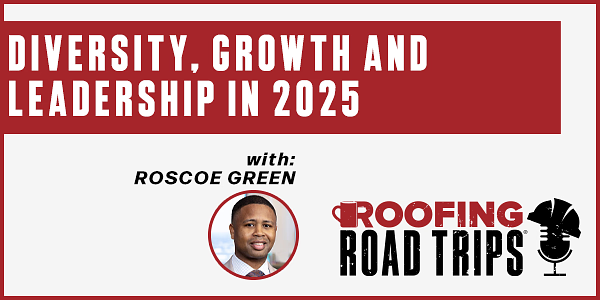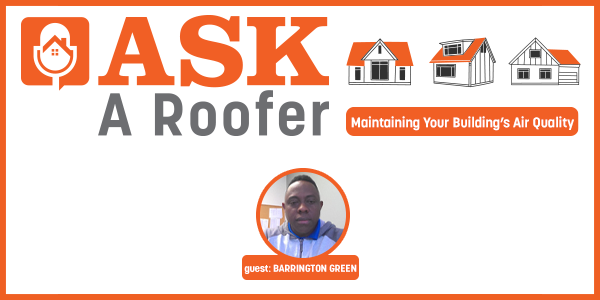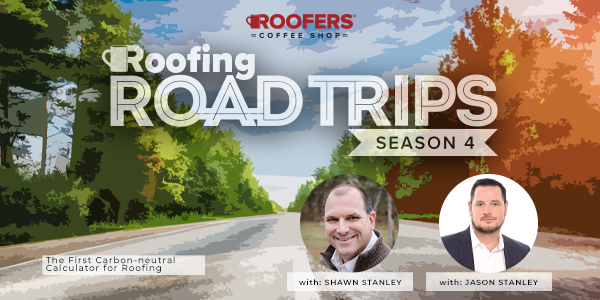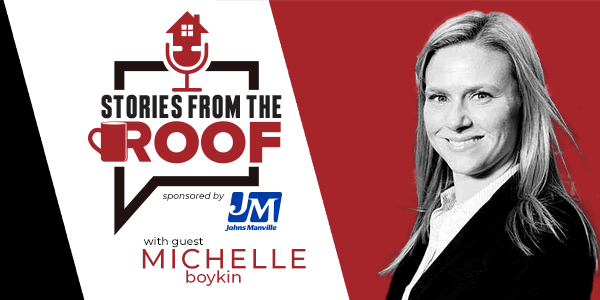Roscoe Green - Diversity, Growth and Leadership in 2025 - PODCAST TRANSCRIPT
May 8, 2025 at 12:00 p.m.Editor's note: The following is the transcript of a live interview with Roscoe Green of Adams & Reese. You can read the interview below or listen to the podcast.
Intro: Welcome to Roofing Road Trips, the podcast that takes you on a thrilling journey across the world of roofing. From fascinating interviews with roofing experts to on-the-road adventures, we'll uncover the stories, innovations and challenges that shape the rooftops over our heads. So fasten your seatbelts and join us as we embark on this exciting roofing road trip.
Karen Edwards: Hello everybody and welcome to another episode of Roofing Road Trips from RoofersCoffeeShop. My name is Karen Edwards and today we are going to welcome Roscoe Green of Adams & Reese to talk about the future and trends and diversity and lots of different topics. So I am really excited for this conversation. Roscoe, welcome to the program.
Roscoe Green: Thank you, Karen. Really, really glad to be here and appreciate you all for inviting me. Look forward to the conversation. I think it'll be a riveting podcast, if you will and I just look forward to it. I'm Roscoe Green. I'm board certified in construction law. Civil litigator, handle construction litigation matters, general construction matters throughout our footprint. That's representing roofing contractors, general contractors, subcontractors, developers, property owners, suppliers, manufacturers, pretty much the entire gamut within the construction industry. I truly consider myself blessed to be a part of our nationally ranked construction team. I've been in and around construction, which I'll talk about for 25 years. I'm a licensed general contractor.
Karen Edwards: I know. I'm reading all this stuff before the episode and I'm like, wait a minute. You're an attorney. You do this, you got a general contractor's license in Florida. I want to step back and tell your story. Set the tone. How did you go from being a contractor to becoming a construction attorney? Tell us.
Roscoe Green: Oh, thanks. It was an interesting journey. I grew up in and around construction. My dad was a general contractor and so I got into construction at an early age. I remember being out in the field, being a laborer during the high school summers and kind of working in the field with my dad as a laborer. Then I kind grew up through the ranks and developed through a foreman and then became superintendent and project manager. Then went to school for construction, got a degree in construction engineering and right after college joined a commercial construction firm in North Florida where I worked as a project engineer, estimator, project manager on government projects, multimillion dollar projects. And so I really have a strong grasp for the construction industry. I understand what contractors are going through on a day-to-day basis. I get it when you're looking at a set of plans and you're trying to determine, should I bid it this way? Is this a competitive advantage or is it a disadvantage? Am I assuming something that I shouldn't be? So I get it.
And my grandfather happened to be a Florida Supreme Court Justice and he was also appointed by President Carter to be the chief justice of the 11th Circuit Court of Appeals. So I always knew, I had a dad in construction and then my grandfather was a Florida Supreme Court Justice and so I knew I wanted to go to law school and so I did. I worked for a boutique construction law firm in Jacksonville and then joined Trent Cotney's law firm in 2017 where we worked hard. We grew that firm and then we were acquired in 2022 by Adams & Reese. And so now we have a nationally ranked construction practice group. We have an incredible roster. I think there's eighty-plus construction attorneys and most of us have significant construction experience and our team's led by Trent Cotney, who needs no introduction.
Karen Edwards: Toney.
Roscoe Green: And David Toney, who are two outstanding attorneys, just great people and leaders. And so that's a little bit about how I got into the space and a little bit about my background.
Karen Edwards: It's almost like you didn't have a choice, right, with that family. Wow. Yeah. No, that's awesome. And kudos to Trent because I know when he had his practice, that was kind of a requirement. If you're going to join my firm, you need to have been in the business and you need to have experience in it. And so I think it's so important that you've been there, done that, you know what's going on and you know what it takes.
And now we said we're going to talk about the future and there's a lot of weird stuff going on in the industry and we could talk for hours about that, but I just want to kind of at a high level, maybe talk about what some of the trends are that you see that might be shaping the industry over the next year or so. What kind of conversations are you having with contractors?
Roscoe Green: There've been frequent conversations considering everything that is going on. You've got the tariffs and the uncertainty surrounding now, which is obviously going to create a potential for significant shifts in price and the availability of materials. I think it'll be similar to what we saw in 2020. Then you have the new immigration policies, which are likely going to decrease the skilled labor pool. And you have an administration that's focused on massive foreign investments in the U.S. And so that's going to create new companies, new mergers and acquisitions in the market. And then there's a shift towards manufacturing in the U.S. and that's going to create more job opportunities. And you combine that with an already a shortage of qualified labor in the pool, market. I think there's just going to be increased competition for the roofing industry for not only skilled labor, but management personnel as well.
One of the, I don't want to say it's a secret, but I mean you can do very well in the construction industry, but there's also going to be a lot of competition. So roofing companies, a lot of the conversations we're having, "How do we address the increases in material prices," and "Is there something we could be doing now proactively?" And the answer is obviously yes, getting with your legal team and looking at your contract, putting in force majeure provisions that make sense and price escalation provisions that make sense.
But on a big picture, roofing companies specifically are going to have to be creative with this climate and attracting and retaining their employees. Like I said, there's a lot of competition going on. There's a lot of uncertainty. And quite frankly, we're in an employee market and so the leaders of the companies are going to really have to hone in and figure out creative ways to attract and retain roofing personnel.
Karen Edwards: Yeah, I like how you said an employee market. It's similar in real estate. We say it's a buyer's market. Well, it's an employee market for sure and you've got to set yourself apart to attract that talent. So it's really important. It's a good point.
Let's talk about how companies can distinguish themselves. What are some things that companies could be doing to attract that talent?
Roscoe Green: Well, you've got to be forward-thinking. Where's the market moving, the technology, AI, that sort of thing. And people tend to be at places where they feel welcome and where they enjoy the people they work with. They're inspired. And so one, you have to have good leadership. Companies really need to focus on that and inspiring others to come work for them, not through talk, but through their actions and the things that they're doing on a day-to-day basis.
The companies that are going to thrive are going to be the ones with leaders that aren't afraid to take risk and step out of their comfort zone. Those leaders will be really plugged in within the roofing industry, taking on leadership roles, speaking engagement, volunteer opportunities, that's big for the younger generation and attracting young personnel and visionary. Those leaders have to have vision. The idea that, hey, we're going to grow this company, is something that everyone can work towards and makes people feel like they're a part of something bigger.
And usually those leaders and the companies that are growing are able to take their ideas and not only talk about it, but execute for the greater good of the industry. It's not only just executing, it's executing for what's good for the roofing industry. And so I think those companies that are able to do that, make their employees feel comfortable, give them something to look forward to, have opportunities for growth and our forward-thinking as far as what's going on on a macro perspective within the market are going to be those companies that just continue to grow and that employees want to join.
Karen Edwards: Yeah. I pulled two really important points out of what you said. You mentioned about the incoming generation and for leaders to be involved in giving back to the industry, participating in associations, so much of the next generation future workforce, as you mentioned, that's really important to them. And you also mentioned technology, AI. I mean, this generation has grown up using those tools, so when they leave their education behind and are ready to join the workforce, they want those tools in their everyday job.
Roscoe Green: Absolutely. And there's some really cool things coming out that we've been seeing within the AI and smart roofing technology. I saw something where there was an AI program that could help with lead generation and products that identify potential customers to create personalized marketing campaigns, scouring the property records and figuring out how old the roofs are and how likely that particular property owner would be to have a leak or... There's just some really cool stuff coming out and that kind of stuff interests new individuals coming into the roofing market, smart roofing technology, smart leak detection and all this stuff, it really is a great time to be in the roofing industry.
Karen Edwards: So advice for, I would think advice for maybe contractors that have been around a while they've been doing this, technology can be a little bit scary, is hire a younger generational person and make that their baby. Have them work on that and figure it out.
Roscoe Green: Absolutely. I mean, that's what the companies that are innovative are the ones that are going to continue to grow and continue to attract that top talent. And that's what you have to, you have to be fluid as a leader of your company and bring in those types of individuals.
Karen Edwards: Yeah. Okay. So I want to mention that Adams & Reese has a diversity committee and you're a co-chair of that. Could you tell me a little bit about that and some initiatives and why that's important for contractors to think about as they move forward in their businesses?
Roscoe Green: So I've been incredibly blessed to serve as the co-chair of Adams & Reese Diversity Committee and it's a committee, a few leaders within our company across our footprint. We meet bi-weekly, discuss things like law school recruiting, professional development opportunities, pro bono opportunities, mentorship, that sort of thing.
For our diverse employees and attorneys at Adams & Reese, diversity really isn't a buzzword. Our firm has a long history of being successful in its diversity efforts because the firm really focuses on attracting and retaining top talent regardless of the person's diversity status, so that we could provide exceptional service to meet our clients where they're at. And when you think about diversity, it's really about a business case, first and foremost. Our goal at Adams & Reese is to leave no stone unturned, that sort of mentality in our recruitment efforts and retention efforts. We really want all of our members of our firm to have opportunities to ensure the long-term success.
Key initiatives that we are working on, recruiting, obviously. We're recruiting outside of our traditional schools with the goal of finding those exceptional candidates, the diamonds in the rough. Really casting our net wide. We're focusing on professional and business development, implementing new initiatives. We have an ARROW initiative within our firm. ARROW stands for Advancement, Recruitment, Retention of Women focusing on relationship development across our firm footprint and otherwise. We're getting our attorneys involved in organizations that really are focused on professional development programs that are designed for high potential mid-career attorneys that connect our attorneys with corporate legal departments and that sort of thing.
And then we're really also focusing on mentorship and really just keying in on making sure that we are not only recruiting the best talent, but retaining them and making sure that they're enjoying the law firm, the practice of law and pricking their brain to see what the firm can do better, how we could grow opportunities. Part of that, making sure that everybody feels like they are part of the team and we're growing in one direction.
Karen Edwards: And that they're seen and heard as well, because it's real easy to talk about it and then bring somebody on board and then, oh, well, they're not really doing this. They just use that to draw me in. But I think the retention part of it is super important and diversity, it's become a political term, unfortunately, but it's really important. And I love how you said women, bringing women into the industry because there's a very small percentage of women currently in the roofing industry, in construction overall. So creating a space where they feel welcome, they have those opportunities to participate in the industry and to grow their career is fantastic. And thinking outside the stereotype of what a construction or roofing business should look like and opening those doors. If you don't do that, you're not going to be able to keep up.
Roscoe Green: Right, a hundred percent. And again, we're in an employee market, so you've got to really focus in, really analyze what you're doing with respect to not only your diverse employees, but all your employees and making sure that everybody feels they're part of a greater good if you will.
Karen Edwards: Yeah. Yeah. So important. So important. So are there any other things that you think are important for contractors to think about as we're in what, four months into 2025 and we mentioned at the beginning that there's a lot of uncertainty in what's going to happen and I know a lot of people are nervous. So what are things that contractors should be thinking about in addition beyond, yes, review your contracts, yes, make sure you have those clauses, yes, look at your culture, any other advice or maybe I shouldn't say advice, we're not supposed to say that when we're talking to attorneys, well, maybe your opinion on what a contractor should be thinking about as 2025 moves ahead?
Roscoe Green: Yeah. Well, there's two things. One, we discuss a lot of different things going on a macro level. Yes, there's going to be uncertainty with material prices and shortages and that sort of thing. And how contractors navigate that could be the success or the failure of the business. And so always having your professionals with you, whether that be accountants or lawyers or whatever during that process to help give you legal advice and here's what the law says, here's changing, this is what this executive order means, that sort of thing is really critical.
Unfortunately, a lot of companies are reactive and not proactive and they come to us after they've already gotten themselves into some trouble. And the most successful companies realize the importance of relying on their professionals and having them every step of the way and communicating with them frequently. And that's what we've been doing a lot recently with all these different executive orders. And every day it seems like there's a new tariff or new threat of tariff and how is this going to affect the supply chain? And so yeah, you have to have that stuff, provisions in your contract and all that stuff, but you also have to be able to plan and you also have to strategize with respect to what's happening in the market.
And so I think the second portion of that is innovation. Innovation in the roofing sector. With innovation comes new laws and that sort of thing, the drones and how that those can be operated. Innovation obviously is a critical driver in the roofing sector. It's really transforming how roofs are designed and installed and maintained. And ultimately we're seeing with the AI and that sort of thing, efficiency and productivity changes, different types of customer interactions and relationships.
I always enjoy getting in a case and finding out someone's using a different type of software because I'm always like, oh, what does this do? There's all types of satellite based roof measurement tools and robotics. I saw something the other day where there's a automatic shingle, a robot that can install shingles. And all this stuff is fantastic, but you have to be able to navigate the laws that are associated with that innovation. And so that's the second part of that is making sure you've got a good team as you're innovating to comply with all the regulations and different things that come along with innovation.
Karen Edwards: It's so important about having good partners and having your professionals on your team, because just as a contractor would tell a building owner or a homeowner, "Oh, you want to install your own roof? Yeah, good luck with that," because they don't know all the intricacies and the details that are needed to have a successful installation and a leak-free roof. Same with legalities and accounting and tax laws and contracts. Don't grab a contract off the internet because someone else popped or off social media. "Hey, do you guys have a contract for this?" "Oh, yeah." Because it needs to be tailored and specific to your business, which is different from any other business out there. Right? You're laughing 'cause you've probably seen that happen before, haven't you?
Roscoe Green: I hate to say it, but I mean, it's a frequent occurrence. We get stuff all the time. "If you would've just called us in advance, you would've known that this is Florida or this is a state where this doesn't work." And so I guess it keeps us in business, but the proactive companies are the ones that are successful and don't make those types of mistakes.
Karen Edwards: And they have to shift the thinking of, oh my gosh, I don't want to spend this money on an accountant or , I don't want to spend this money on an attorney. Well, it's going to cost you more money in the long run if you do something wrong and then have to dig out. Right? Yeah.
Roscoe Green: You have to pay for the mistake and then you have to pay for us and I'm a contractor at heart and if we can keep you from not having to pay us, that's great.
Karen Edwards: That's great. Yeah. Okay. So let's talk about maybe there's a young professional out there who's just getting into the construction industry and they want to be a leader and they want to charge a new path for themselves. What would you tell them? What are some suggestions and ideas for them to be successful?
Roscoe Green: Yeah. Well, to be successful, one, you've got to be connected. You've got to be involved. Get involved with NRCA, get involved with your state chapter of the Roofing Association, your chapter and meet people, talk to people. Take the opportunities that are provided. You'll come across stuff like this, a podcast, getting in and talking. Be a thought leader. Take time. Your roofing is a craft. And so it's not going to happen overnight. You're not going to become a CEO or the leader of your organization overnight. And so how do you get there? I always think about something that one of my mentors told me is you have to lead from where you are. And so if you're a foreman or if you're a laborer, if you're someone just getting into the industry, take the qualities of a leader, be hardworking, be visionary, be decisive, be resilient in what you're doing in the field. And others will see that and you'll start growing through the ranks.
And by doing that, you'll also develop your skill, if you will, your craft and those types of qualities, the qualities of a leader, start from wherever you are. And so that would be my advice. What really worked for me was just getting involved in a bunch of organizations. And even if I'm not the power, if you will, by having all those connects, I can connect the power and that's just as powerful. And then you start rising up the ranks and people start taking notice and you've got the qualities of a leader, others start following. And that would be my two cents.
Karen Edwards: Yeah, I love it. And you mentioned what your mentor shared with you and I just want to reinforce the importance of mentorship for a younger person. And maybe if you have someone in your company that is a little bit more mature and can be a mentor, great. But if you don't, being involved in those associations and in your industry-related organizations could help you find that mentor.
Roscoe Green: A hundred percent. Most of my mentors came from being involved in those organizations, getting on different boards or chairing different committees, that sort of thing. That's where you meet other folks that are growing in the same direction.
Karen Edwards: Yeah. And business owners, contractors, make sure that you have that environment for your incoming next generation to have that opportunity to be involved because it's only going to benefit your business at the end of the day.
Roscoe Green: A hundred percent.
Karen Edwards: Yeah. Awesome. Well, Roscoe, this was a fantastic conversation. I want to thank you again for being here and sharing with us your background, what you're seeing in the industry and I'm sure our listeners got a lot out of this conversation. Thank you.
Roscoe Green: Absolutely, Karen. Again, thank you for having me. It was always a good time joining the podcast and you guys are doing an outstanding job.
Karen Edwards: Oh, thank you. And thank you everybody out there for listening. We love that you're here and we encourage you to follow us on social media, subscribe on your favorite podcast platform because we want to see you on a future episode of Roofing Road Trips. And if you want to know more about Adams & Reese and Roscoe, visit their directory on Rooferscoffeeshop.com. It has all their information and contact and reach out if you're not working with them because they can really help you get your business where it needs to be with all this uncertainty that's coming.
Again, thanks Roscoe and we'll see you all next time. Bye-bye.
Outro: If you've enjoyed the ride, don't forget to hit that subscribe button and join us on every roofing adventure. Make sure to visit Rooferscoffeeshop.com to learn more. Thanks for tuning in and we'll catch you on the next Roofing Road Trip.





















Comments
Leave a Reply
Have an account? Login to leave a comment!
Sign In